Schmitt C.B. (ed.) The Cambridge History of Renaissance Philosophy
Подождите немного. Документ загружается.

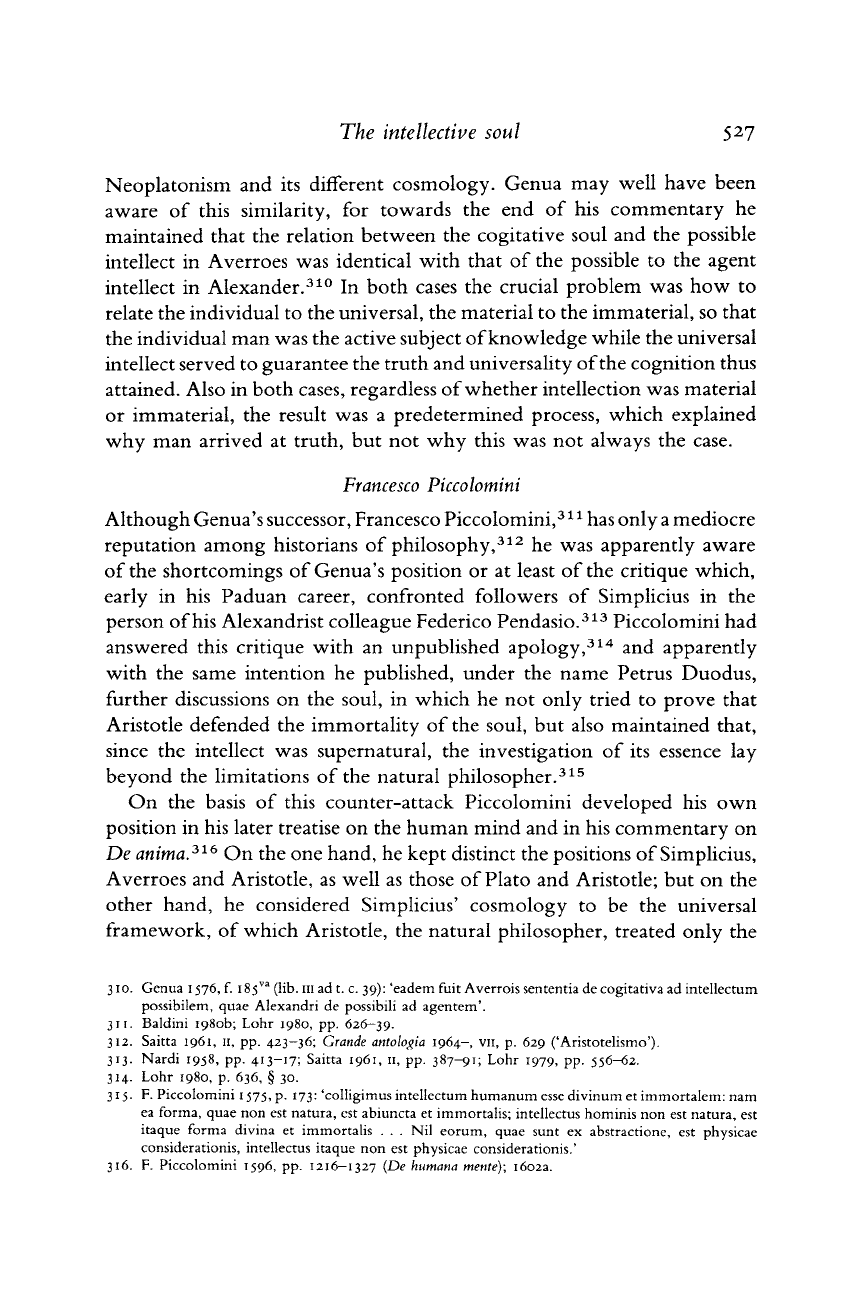
The intellective soul
527
Neoplatonism
and its
different cosmology. Genua
may
well
have been
aware
of
this similarity,
for
towards
the end of his
commentary
he
maintained
that
the
relation between
the
cogitative soul
and the
possible
intellect
in
Averroes
was
identical with
that
of the
possible
to the
agent
intellect
in
Alexander.
310
In
both cases
the
crucial problem
was how to
relate
the
individual
to the
universal,
the
material
to the
immaterial,
so
that
the individual
man
was
the
active subject
of
knowledge
while
the
universal
intellect served
to
guarantee
the truth and
universality
of
the cognition
thus
attained.
Also
in
both cases, regardless
of
whether intellection
was
material
or immaterial,
the
result
was a
predetermined process, which explained
why
man
arrived
at truth, but not why
this
was not
always
the
case.
Francesco
Piccolomini
Although
Genua's successor, Francesco Piccolomini,
311
has only
a
mediocre
reputation among historians
of
philosophy,
312
he was
apparently aware
of
the
shortcomings
of
Genua's position
or at
least
of the
critique which,
early
in his
Paduan career, confronted followers
of
Simplicius
in the
person
of
his Alexandrist colleague Federico Pendasio.
313
Piccolomini
had
answered this critique with
an
unpublished apology,
314
and
apparently
with
the
same intention
he
published, under
the
name Petrus Duodus,
further discussions
on the
soul,
in
which
he not
only tried
to
prove
that
Aristotle
defended
the
immortality
of the
soul,
but
also maintained
that,
since
the
intellect
was
supernatural,
the
investigation
of its
essence
lay
beyond
the
limitations
of the
natural philosopher.
315
On
the
basis
of
this counter-attack Piccolomini developed
his own
position
in his
later treatise
on the
human mind
and in his
commentary
on
De
anima.
316
On the one
hand,
he
kept distinct
the
positions
of
Simplicius,
Averroes
and
Aristotle,
as
well
as
those
of
Plato
and
Aristotle;
but on the
other hand,
he
considered Simplicius' cosmology
to be the
universal
framework,
of
which Aristotle,
the
natural philosopher, treated only
the
310.
Genua 1576, f. 185™ (lib. in ad t. c. 39): 'eadem fuit Averrois sententia de cogitativa ad intellectum
possibilem, quae Alexandri de possibili ad agentem'.
311.
Baldini 1980b;
Lohr
1980, pp. 626—39.
312.
Saitta 1961, 11, pp. 423-36;
Grande antologia
1964-, vn, p. 629 ('Aristotelismo').
313.
Nardi 1958, pp.
413-17;
Saitta 1961, 11, pp. 387-91;
Lohr
1979, pp. 556-62.
314.
Lohr
1980, p. 636, § 30.
315.
F. Piccolomini 1575, p. 173: 'colligimus intellectum humanum
esse
divinum et immortalem: nam
ea forma, quae non est natura, est abiuncta et immortalis; intellectus hominis non est natura, est
itaque forma divina et immortalis . . . Nil eorum, quae sunt ex abstractione, est physicae
considerationis, intellectus itaque non est physicae considerationis.'
316.
F. Piccolomini 1596, pp.
1216-1327
(De
humana
mente);
1602a.
Cambridge Histories Online © Cambridge University Press, 2008
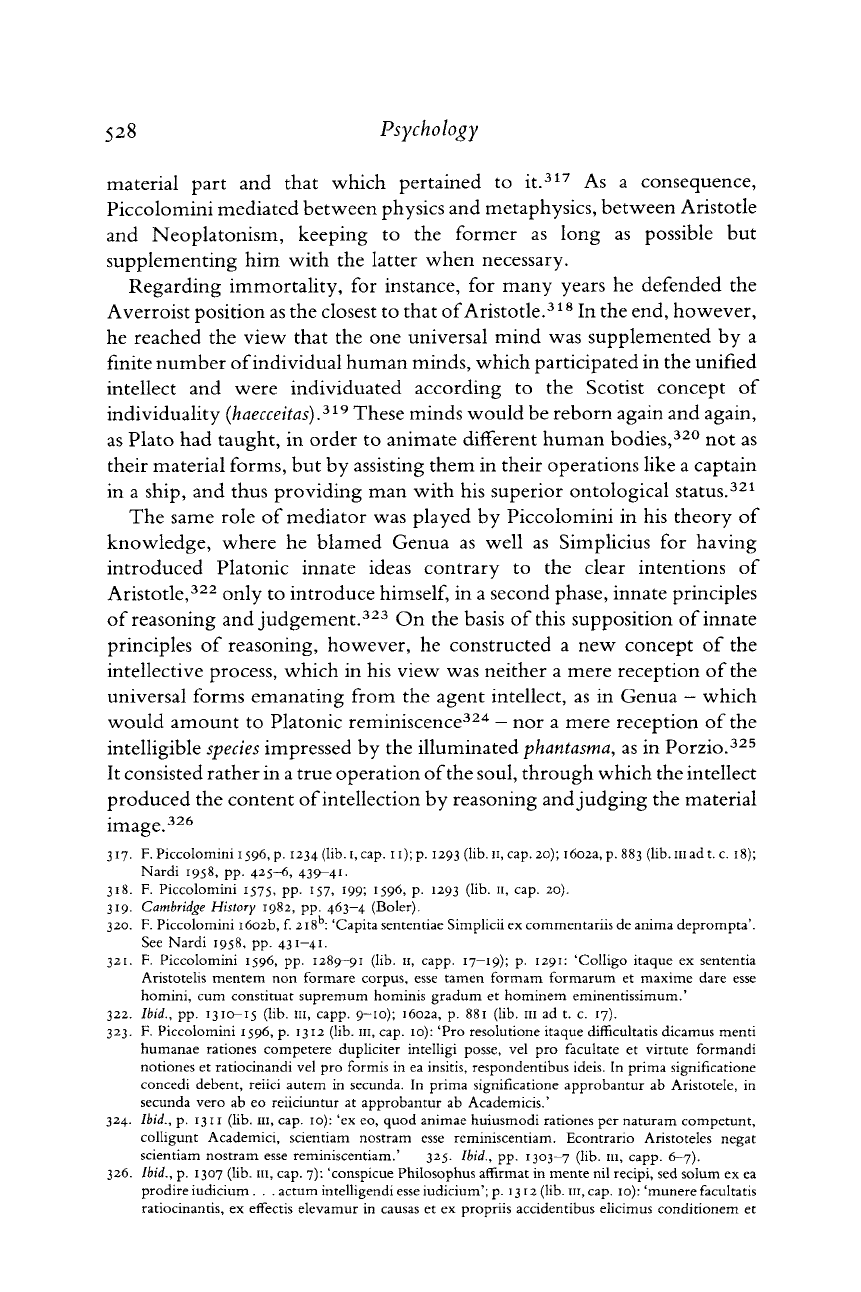
528
Psychology
material part
and
that
which pertained
to
it.
317
As a
consequence,
Piccolomini
mediated between physics
and
metaphysics, between Aristotle
and Neoplatonism, keeping
to the
former
as
long
as
possible
but
supplementing
him
with
the
latter when necessary.
Regarding
immortality,
for
instance,
for
many years
he
defended
the
Averroist
position
as the
closest
to
that
of
Aristotle.
318
In the
end, however,
he reached
the
view
that
the one
universal mind
was
supplemented
by a
finite number
of
individual human minds, which participated
in the
unified
intellect
and
were individuated according
to the
Scotist concept
of
individuality
(haecceitas).
319
These minds would
be
reborn again
and
again,
as Plato
had
taught,
in
order
to
animate different human bodies,
320
not as
their material forms,
but by
assisting them
in
their operations like
a
captain
in
a
ship,
and
thus providing
man
with
his
superior ontological status.
321
The
same role
of
mediator
was
played
by
Piccolomini
in his
theory
of
knowledge,
where
he
blamed Genua
as
well
as
Simplicius
for
having
introduced Platonic innate ideas contrary
to the
clear intentions
of
Aristotle,
322
only
to
introduce himself,
in a
second phase, innate principles
of
reasoning
and
judgement.
323
On the
basis
of
this supposition
of
innate
principles
of
reasoning, however,
he
constructed
a new
concept
of the
intellective
process, which
in his
view
was
neither
a
mere reception
of the
universal forms emanating from
the
agent intellect,
as in
Genua
—
which
would
amount
to
Platonic reminiscence
324
—
nor a
mere reception
of the
intelligible
species impressed
by the
illuminated phantasma,
as in
Porzio.
325
It consisted rather
in a
true
operation
of
the soul, through which
the
intellect
produced
the
content
of
intellection
by
reasoning and
judging
the
material
image.
326
317.
F. Piccolomini 1596, p. 1234 (lib. 1, cap.
11);
p. 1293 (lib.
11,
cap. 20); 1602a, p. 883 (lib.
111
ad t. c. 18);
Nardi
1958, pp. 425-6, 439-41.
318.
F. Piccolomini 1575, pp. 157, 199; 1596, p. 1293 (lib. 11, cap. 20).
319. Cambridge History
1982, pp.
463-4
(Boler).
320. F. Piccolomini 1602b, f. 2i8
b
:
'Capita
sententiae Simplicii ex commentariis de anima deprompta'.
See Nardi 1958, pp.
431-41.
321.
F. Piccolomini 1596, pp. 1289-91 (lib. 11,
capp.
17-19);
p. 1291: 'Colligo itaque ex sententia
Aristotelis mentem non formare corpus,
esse
tamen formam formarum et maxime dare
esse
homini, cum constituât supremum hominis gradum et hominem eminentissimum.'
322.
Ibid.,
pp.
1310-15
(lib. in,
capp.
9-10); 1602a, p. 881 (lib. m ad t. c. 17).
323. F. Piccolomini 1596, p. 1312 (lib. in, cap. 10): 'Pro resolutione itaque difficultatis dicamus menti
humanae rationes competere dupliciter intelligi
posse,
vel pro facultate et virtute formandi
notiones
et ratiocinandi vel pro formis in ea insitis, respondentibus ideis. In prima significatione
concedi debent, reiici autem in secunda. In prima significatione approbantur ab Aristotele, in
secunda vero ab eo reiiciuntur at approbantur ab Academicis.'
324.
Ibid.,
p. 1311 (lib. in, cap. 10): 'ex eo, quod animae huiusmodi rationes per naturam competunt,
colligunt Academici, scientiam nostram
esse
reminiscentiam. Econtrario Aristoteles negat
scientiam nostram
esse
reminiscentiam.' 325.
Ibid.,
pp. 1303-7 (lib. m,
capp.
6-7).
326.
Ibid.,
p. 1307 (lib. in, cap. 7): 'conspicue Philosophus affirmât in mente nil recipi, sed solum ex ea
prodire iudicium . . . actum intelligendi
esse
iudicium'; p. 1312 (lib. in, cap. 10): 'munere facultatis
ratiocinantis, ex effectis elevamur in causas et ex propriis accidentibus elicimus conditionem et
Cambridge Histories Online © Cambridge University Press, 2008
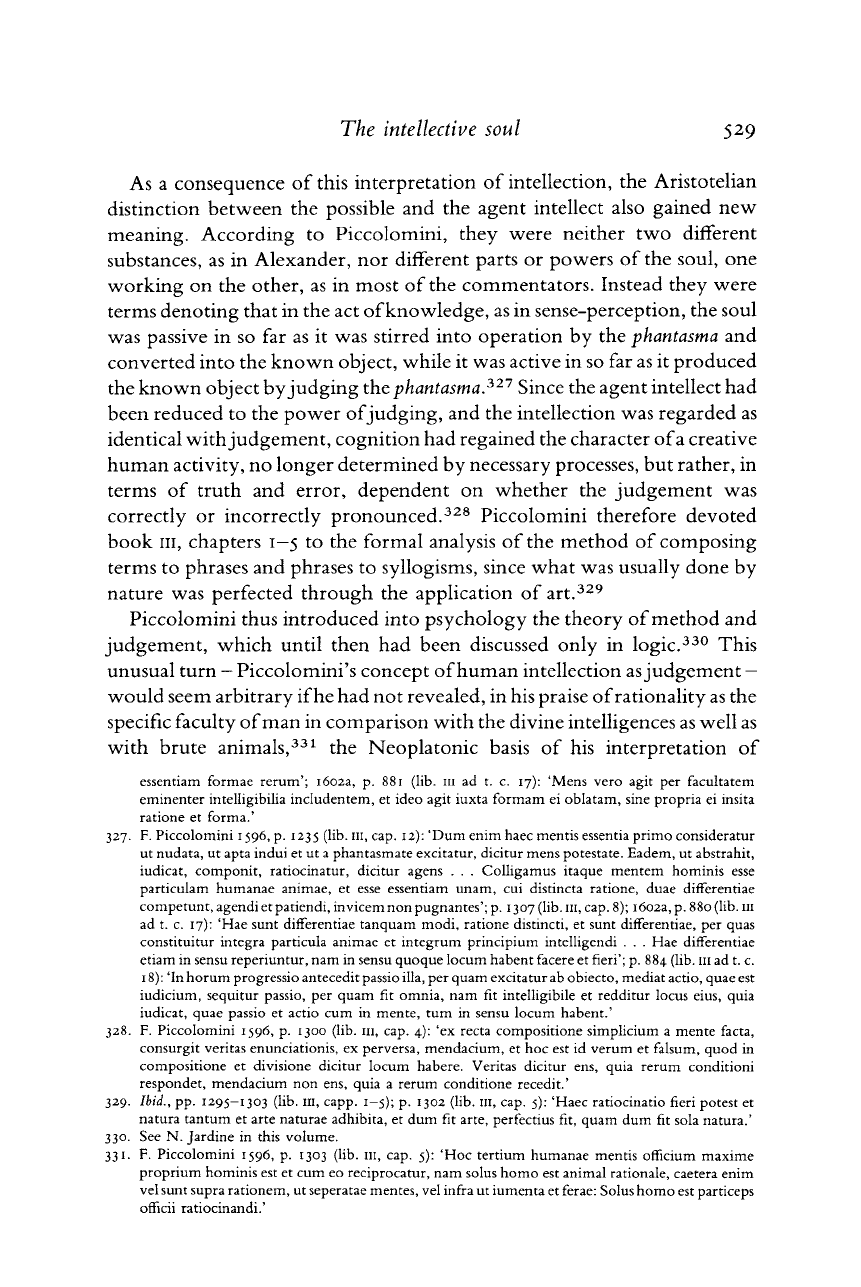
The intellective soul 529
As
a
consequence
of
this interpretation
of
intellection,
the
Aristotelian
distinction between
the
possible
and the
agent intellect also gained
new
meaning. According
to
Piccolomini, they were neither
two
different
substances,
as in
Alexander,
nor
different
parts
or
powers
of the
soul,
one
working
on the
other,
as in
most
of the
commentators. Instead they were
terms denoting
that
in the act
of
knowledge,
as in
sense-perception,
the
soul
was
passive
in so far as it was
stirred into operation
by the
phantasma
and
converted into
the
known object, while
it
was active
in so far as it
produced
the known object
by
judging the phantasma.
327
Since
the
agent intellect
had
been reduced
to the
power
of
judging,
and the
intellection
was
regarded
as
identical
with
judgement, cognition
had
regained
the
character
of
a creative
human activity,
no
longer determined
by
necessary processes,
but
rather,
in
terms
of truth and
error, dependent
on
whether
the
judgement
was
correctly
or
incorrectly pronounced.
328
Piccolomini therefore devoted
book
in,
chapters 1—5
to the
formal analysis
of the
method
of
composing
terms
to
phrases
and
phrases
to
syllogisms, since what
was
usually done
by
nature
was
perfected through
the
application
of art.
329
Piccolomini
thus
introduced into psychology
the
theory
of
method
and
judgement, which until then
had
been discussed only
in
logic.
330
This
unusual
turn
—
Piccolomini's concept
of
human intellection as judgement
—
would
seem arbitrary
if
he
had not
revealed,
in his
praise
of
rationality
as the
specific
faculty
of
man
in
comparison with
the
divine intelligences
as
well
as
with
brute
animals,
331
the
Neoplatonic basis
of his
interpretation
of
essentiam formae rerum'; 1602a, p. 881 (lib. in ad t. c. 17): 'Mens vero agit per facultatem
eminenter intelligibilia includentem, et ideo agit iuxta formam ei oblatam,
sine
propria ei insita
ratione et forma.'
327.
F. Piccolomini 1596, p. 1235 (lib. in, cap. 12): 'Dum enim haec mentis
essentia
primo consideratur
ut
nudata, ut apta indui et ut a phantasmate excitatur, dicitur
mens
potestate. Eadem, ut abstrahit,
iudicat,
componit, ratiocinatur, dicitur agens . . . Colligamus itaque mentem hominis
esse
particulam
humanae animae, et
esse
essentiam unam, cui distincta ratione, duae differentiae
competunt, agendi et patiendi, invicemnon pugnantes'; p. 1307 (lib. in, cap. 8); 1602a, p. 880 (lib. ш
ad
t. c. 17): 'Hae sunt differentiae tanquam modi, ratione distincti, et sunt differentiae, per quas
constituitur integra particula animae et integrum principium intelligendi . . . Hae differentiae
etiam in
sensu
reperiuntur, nam in
sensu
quoque locum habent facere et fieri'; p. 884 (lib. ш ad t. c.
18):
'In horum progressio antecedit passio ilia, per quam excitatur ab obiecto, mediat actio, quae est
iudicium, sequitur passio, per quam fit omnia, nam fit intelligibile et redditur locus eius, quia
iudicat,
quae passio et actio cum in mente, turn in
sensu
locum habent.'
328. F. Piccolomini 1596, p. 1300 (lib. in, cap. 4): 'ex recta compositione simplicium a mente facta,
consurgit Veritas enunciationis, ex perversa, mendacium, et hoc est id verum et falsum, quod in
compositione et divisione dicitur locum habere. Veritas dicitur ens, quia rerum conditioni
respondet, mendacium non ens, quia a rerum conditione recedit.'
329.
Ibid.,
pp. 1295-1303 (lib. in,
capp.
1-5); p. 1302 (lib. in, cap. 5): 'Haec ratiocinatio fieri potest et
natura
tantum et arte naturae adhibita, et dum fit arte, perfectius fit, quam dum fit
sola
natura.'
330. See N. Jardine in this volume.
331.
F. Piccolomini 1596, p. 1303 (lib. in, cap. 5): 'Hoc tertium humanae mentis officium maxime
proprium
hominis est et cum eo reciprocatur, nam
solus
homo est animal rationale, caetera enim
vel
sunt supra rationem, ut seperatae mentes, vel infra ut iumenta et ferae: Solus homo est particeps
officii ratiocinandi.'
Cambridge Histories Online © Cambridge University Press, 2008
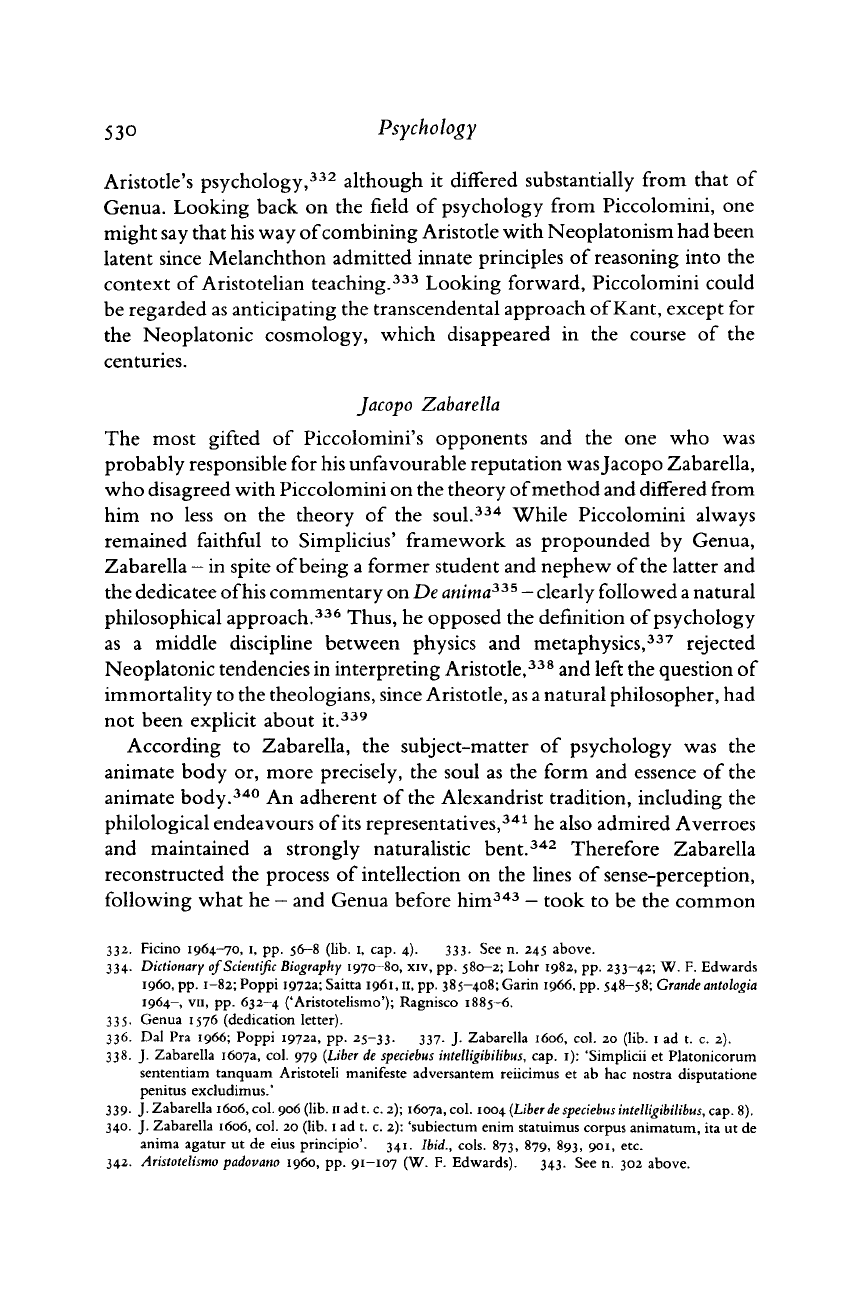
530
Psychology
Aristotle's
psychology,
332
although it differed substantially from
that
of
Genua.
Looking back on the field of psychology from Piccolomini, one
might say
that
his way
of
combining
Aristotle with Neoplatonism had been
latent since Melanchthon admitted
innate
principles of reasoning into the
context
of Aristotelian teaching.
333
Looking forward, Piccolomini could
be regarded as anticipating the transcendental approach
of
Kant,
except for
the Neoplatonic cosmology, which disappeared in the course of the
centuries.
Jacopo Zabarella
The
most gifted of Piccolomini's opponents and the one who was
probably responsible for his unfavourable reputation
was
Jacopo Zabarella,
who
disagreed with Piccolomini on the theory
of
method and differed from
him no less on the theory of the soul.
334
While Piccolomini always
remained faithful to Simplicius' framework as propounded by Genua,
Zabarella
- in spite
of
being
a former
student
and nephew of the
latter
and
the dedicatee
of
his commentary on De
anima
335
—
clearly followed a
natural
philosophical
approach.
336
Thus, he opposed the definition
of
psychology
as a middle discipline between physics and metaphysics,
337
rejected
Neoplatonic tendencies in interpreting Aristotle,
338
and left the question of
immortality to the theologians, since Aristotle, as a
natural
philosopher, had
not been explicit about it.
339
According
to Zabarella, the subject-matter of psychology was the
animate body or, more precisely, the soul as the form and essence of the
animate body.
340
An
adherent
of the Alexandrist tradition, including the
philological
endeavours
of
its representatives,
341
he also admired Averroes
and maintained a strongly naturalistic bent.
342
Therefore Zabarella
reconstructed the process of intellection on the lines of sense-perception,
following
what he - and Genua before him
343
- took to be the common
332.
Ficino
1964-70,
1, pp. 56-8 (lib. 1, cap. 4). 333. See n. 245
above.
334. Dictionary of Scientific Biography
1970-80,
xiv, pp.
580-2;
Lohr
1982, pp.
233-42;
W. F.
Edwards
i960,
pp. 1-82;
Poppi
1972a;
Saitta
1961,11, pp.
385-408;
Garin
1966, pp.
548-58;
Grande antologia
1964-,
vii, pp.
632-4
('Aristotelismo');
Ragnisco
1885-6.
335.
Genua
1576
(dedication
letter).
336. Dal Pra 1966;
Poppi
1972a,
pp.
25-33.
337- J-
Zabarella
1606, col. 20 (lib. 1 ad t. c. 2).
338. J.
Zabarella
1607a,
col. 979 (Liber de speciebus intelligibilibus, cap. 1):
'Simplicii
et
Platonicorum
sententiam
tanquam
Aristoteli
manifeste
adversantem
reiicimus
et ab hac
nostra
disputatione
penitus
excludimus.'
339. J.
Zabarella
1606, col. 906 (lib.
11
ad t. c. 2);
1607a,
col. 1004 (Liber de speciebus intelligibilibus, cap. 8).
340. J.
Zabarella
1606, col. 20 (lib. 1 ad t. c. 2):
'subiectum
enim
statuimus
corpus
animatum,
ita ut de
anima
agatur
ut de
eius
principio'.
341. Ibid.,
cols.
873, 879, 893, 901, etc.
342. Aristotelismo
padovano
i960,
pp.
91-107
(W. F.
Edwards).
343. See n. 302
above.
Cambridge Histories Online © Cambridge University Press, 2008
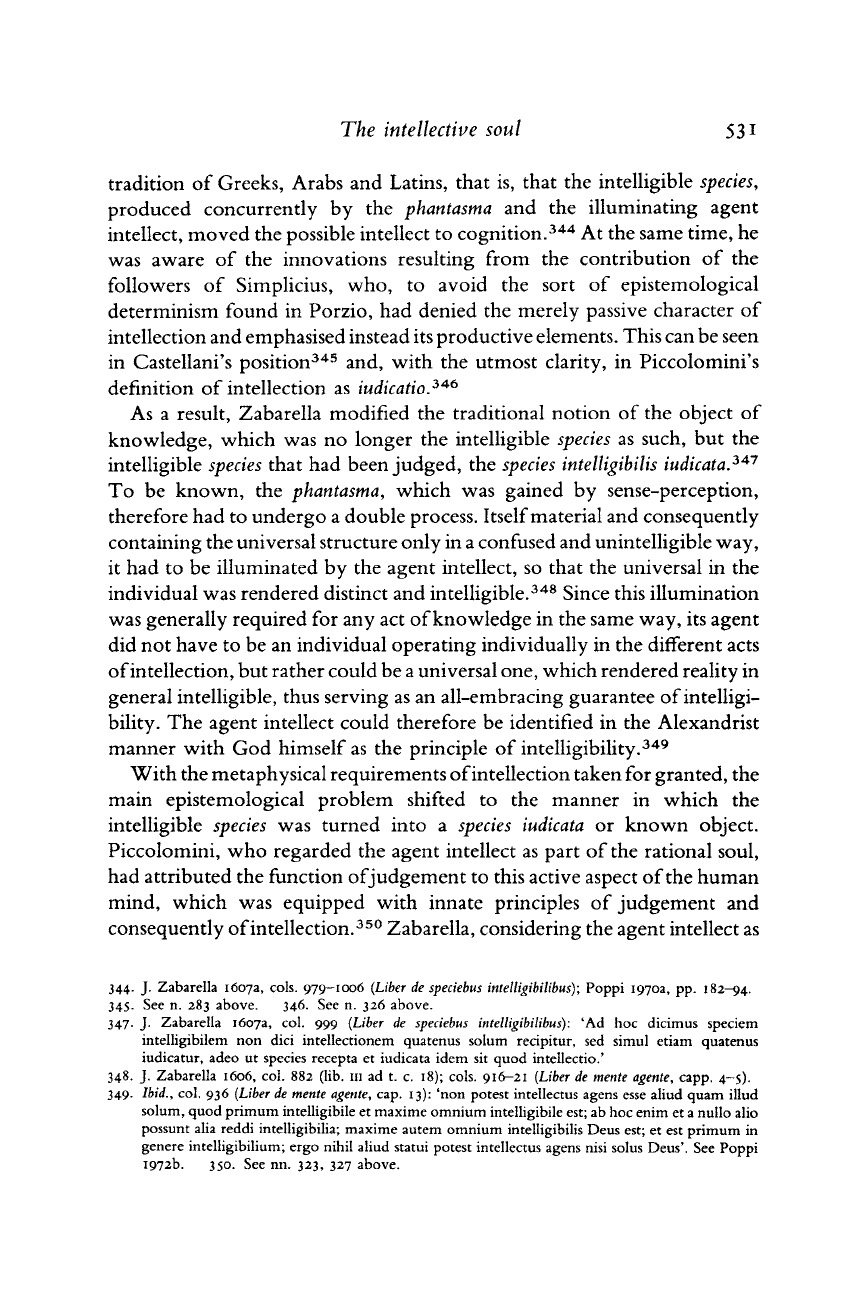
The intellective soul
531
tradition
of
Greeks, Arabs
and
Latins,
that
is,
that
the
intelligible species,
produced concurrently
by the
phantasma
and the
illuminating agent
intellect, moved
the
possible intellect
to
cognition.
344
At the
same time,
he
was
aware
of the
innovations resulting from
the
contribution
of the
followers
of
Simplicius,
who, to
avoid
the
sort
of
epistemological
determinism found
in
Porzio,
had
denied
the
merely passive character
of
intellection
and
emphasised instead its productive elements. This can
be
seen
in Castellani's position
345
and,
with
the
utmost clarity,
in
Piccolomini's
definition
of
intellection
as
iudicatio.
346
As
a
result, Zabarella modified
the
traditional notion
of the
object
of
knowledge,
which
was no
longer
the
intelligible species
as
such,
but the
intelligible
species
that
had
been judged,
the
species intelligibilis iudicata.
347
To
be
known,
the
phantasma,
which
was
gained
by
sense-perception,
therefore
had to
undergo
a
double process.
Itself
material
and
consequently
containing
the
universal
structure
only
in a
confused
and
unintelligible way,
it
had to be
illuminated
by the
agent intellect,
so
that
the
universal
in the
individual was rendered distinct
and
intelligible.
348
Since this illumination
was
generally required
for any act
of
knowledge
in the
same way,
its
agent
did
not
have
to be an
individual operating individually
in the
different acts
of
intellection,
but
rather
could
be a
universal one, which rendered reality
in
general intelligible,
thus
serving
as an
all-embracing guarantee
of
intelligi-
bility.
The
agent intellect could therefore
be
identified
in the
Alexandrist
manner
with
God
himself
as the
principle
of
intelligibility.
349
With
the
metaphysical requirements
of
intellection taken
for
granted,
the
main epistemological problem shifted
to the
manner
in
which
the
intelligible
species
was
turned
into
a
species iudicata
or
known object.
Piccolomini,
who
regarded
the
agent intellect
as
part
of the
rational soul,
had
attributed
the
function
of
judgement
to
this active aspect
of
the human
mind, which
was
equipped with
innate
principles
of
judgement
and
consequently
of
intellection.
350
Zabarella, considering
the
agent intellect
as
344. J. Zabarella 1607a, cols. 979—1006
(Liber
de
speciebus intelligibilibus);
Poppi 1970a, pp. 182-94.
345.
See n. 283 above. 346. See n. 326 above.
347.
J. Zabarella 1607a, col. 999
(Liber
de
speciebus intelligibilibus):
'Ad hoc dicimus speciem
intelligibilem non dici intellectionem quatenus solum recipitur, sed simul etiam quatenus
iudicatur,
adeo ut species recepta et iudicata idem sit quod intellectio.'
348. J. Zabarella 1606, col. 882 (lib. in ad t. c. 18); cols. 916-21
(Liber
de
mente
agente,
capp.
4-5).
349.
Ibid.,
col. 936
(Liber
de
mente
agente,
cap. 13): 'non potest intellectus agens
esse
aliud quam illud
solum, quod primum intelligibile et maxime omnium intelligibile est; ab hoc enim et a nullo alio
possunt alia reddi intelligibilia; maxime autem omnium intelligibilis Deus est; et est primum in
genere intelligibilium; ergo nihil aliud statui potest intellectus agens
nisi
solus
Deus'. See Poppi
1972b.
350. See nn. 323, 327 above.
Cambridge Histories Online © Cambridge University Press, 2008
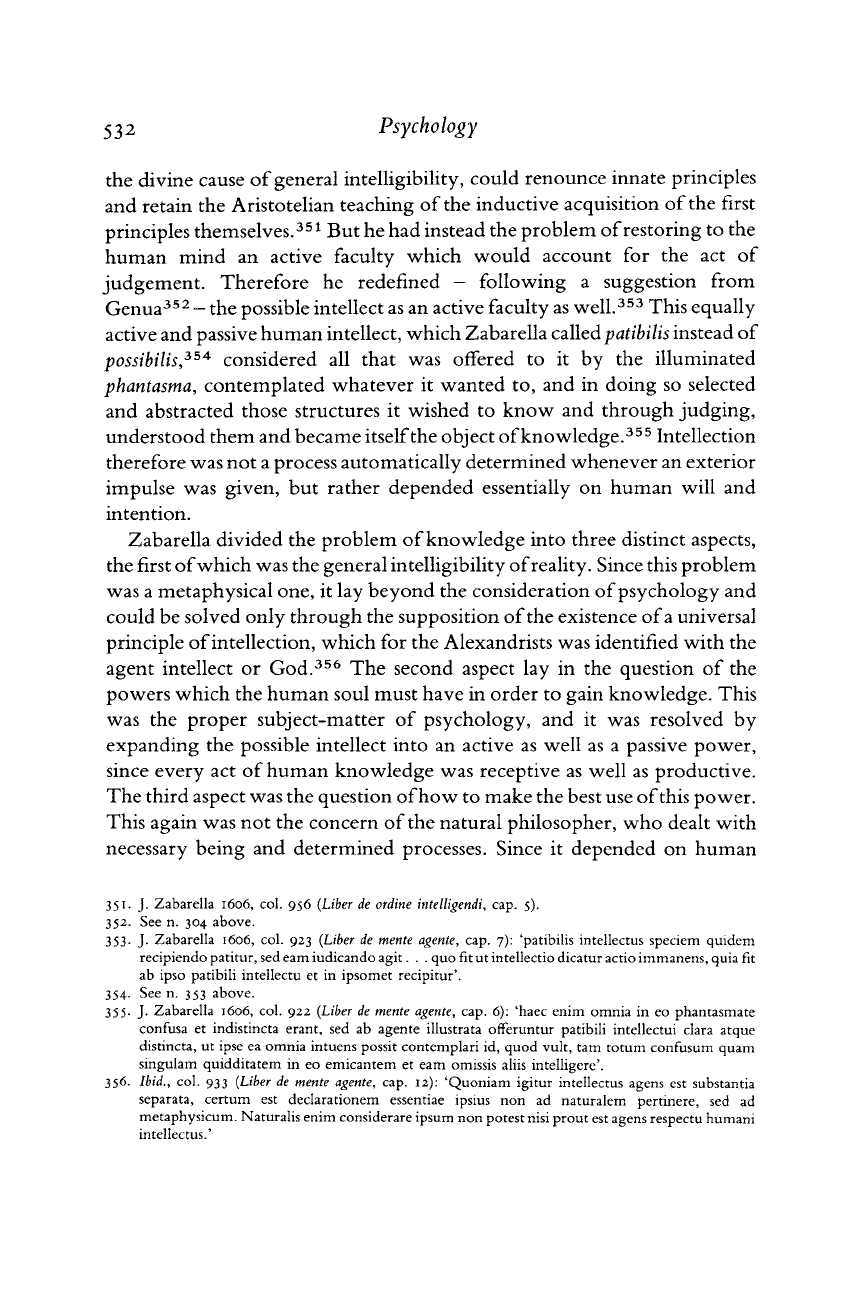
532
Psychology
the divine cause
of
general intelligibility, could renounce
innate
principles
and retain
the
Aristotelian teaching
of
the inductive acquisition
of the
first
principles themselves.
351
But he had
instead
the
problem
of
restoring
to the
human mind
an
active faculty which would account
for the act of
judgement. Therefore
he
redefined
-
following
a
suggestion from
Genua
352
- the
possible intellect
as an
active faculty
as
well.
353
This equally
active
and
passive human intellect, which Zabarella
called
patibilis instead
of
possibilis,
354
considered
all
that
was
offered
to it by the
illuminated
phantasma,
contemplated whatever
it
wanted
to, and in
doing
so
selected
and abstracted those
structures
it
wished
to
know
and
through judging,
understood them
and
became
itself
the object
of
knowledge.
355
Intellection
therefore was
not a
process automatically determined whenever
an
exterior
impulse
was
given,
but
rather
depended essentially
on
human
will
and
intention.
Zabarella divided
the
problem
of
knowledge into
three
distinct aspects,
the first
of
which
was
the
general intelligibility
of
reality. Since this problem
was
a
metaphysical one,
it lay
beyond
the
consideration
of
psychology
and
could
be
solved only through
the
supposition
of
the existence
of
a universal
principle
of
intellection, which
for the
Alexandrists was identified with
the
agent intellect
or
God.
356
The
second aspect
lay in the
question
of the
powers which
the
human soul must have
in
order
to
gain knowledge. This
was
the
proper subject-matter
of
psychology,
and it was
resolved
by
expanding
the
possible intellect into
an
active
as
well
as a
passive power,
since every
act of
human knowledge
was
receptive
as
well
as
productive.
The
third
aspect was
the
question
of
how
to
make
the
best use
of
this power.
This
again
was not the
concern
of
the
natural
philosopher,
who
dealt with
necessary being
and
determined processes. Since
it
depended
on
human
351.
J. Zabarella 1606, col. 956
(Liber
de
ordine intelligendi,
cap. 5).
352.
See n. 304 above.
353.
J. Zabarella 1606, col. 923
(Liber
de
mente
agente,
cap. 7): 'patibilis intellectus speciem quidem
recipiendo patitur, sed earn iudicando agit. . . quo fit ut intellectio dicatur actio immanens, quia fit
ab
ipso patibili intellectu et in ipsomet recipitur'.
354. See n. 353 above.
355.
J. Zabarella 1606, col. 922
(Liber
de
mente
agente,
cap. 6): 'haec enim omnia in eo phantasmate
confusa et indistincta erant, sed ab agente illustrata offeruntur patibili intellectui clara atque
distincta, ut ipse ea omnia intuens possit contemplari id, quod vult, tarn totum confusum quam
singulam quidditatem in eo emicantem
et earn
omissis
aliis intelligere'.
356.
Ibid.,
col. 933
(Liber
de
mente
agente,
cap. 12): 'Quoniam igitur intellectus agens est substantia
separata,
certum est declarationem essentiae ipsius non ad naturalem pertinere, sed ad
metaphysicum.
Naturalis enim considerare ipsum non potest
nisi
prout est agens respectu humani
intellectus.'
Cambridge Histories Online © Cambridge University Press, 2008
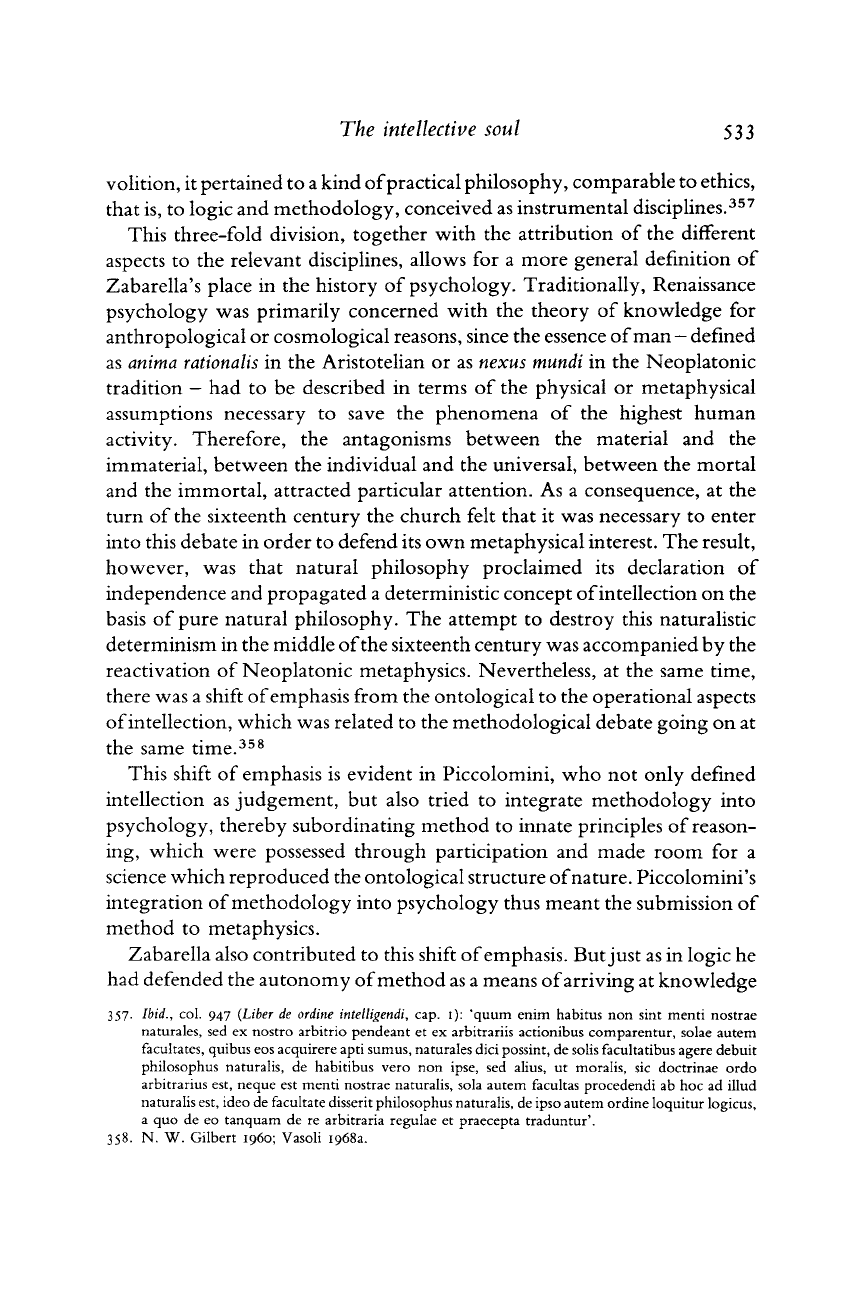
The intellective soul
533
volition,
it
pertained
to a
kind
of
practical philosophy, comparable
to
ethics,
that
is,
to
logic
and
methodology, conceived
as
instrumental disciplines.
357
This
three-fold division, together with
the
attribution
of the
different
aspects
to the
relevant disciplines, allows
for a
more general definition
of
Zabarella's place
in the
history
of
psychology.
Traditionally, Renaissance
psychology
was
primarily concerned with
the
theory
of
knowledge
for
anthropological
or
cosmological reasons, since
the
essence
of
man
—
defined
as anima rationalis
in the
Aristotelian
or as
nexus
mundi in the
Neoplatonic
tradition
—
had to be
described
in
terms
of the
physical
or
metaphysical
assumptions necessary
to
save
the
phenomena
of the
highest human
activity.
Therefore,
the
antagonisms between
the
material
and the
immaterial, between
the
individual
and the
universal, between
the
mortal
and
the
immortal, attracted particular attention.
As a
consequence,
at the
turn
of the
sixteenth century
the
church felt
that it was
necessary
to
enter
into this debate
in
order
to
defend
its own
metaphysical interest.
The
result,
however,
was that
natural philosophy proclaimed
its
declaration
of
independence
and
propagated
a
deterministic concept
of
intellection
on the
basis
of
pure natural philosophy.
The
attempt
to
destroy this naturalistic
determinism
in the
middle
of
the sixteenth century was accompanied
by the
reactivation
of
Neoplatonic metaphysics. Nevertheless,
at the
same time,
there
was
a
shift
of
emphasis from
the
ontological
to the
operational aspects
of
intellection, which was related
to the
methodological debate going
on at
the same time.
358
This
shift
of
emphasis
is
evident
in
Piccolomini,
who not
only defined
intellection
as
judgement,
but
also tried
to
integrate methodology into
psychology,
thereby subordinating method
to
innate principles
of
reason-
ing,
which were possessed through participation
and
made room
for a
science
which reproduced
the
ontological structure
of
nature. Piccolomini's
integration
of
methodology into psychology
thus
meant
the
submission
of
method
to
metaphysics.
Zabarella also contributed
to
this shift
of
emphasis.
But
just
as in
logic
he
had defended
the
autonomy
of
method
as a
means
of
arriving
at
knowledge
357. Ibid.,
col. 947
(Liber
de
ordine intelligendi,
cap. 1): 'quum enim habitus non sint menti nostrae
naturales, sed ex nostro arbitrio pendeant et ex arbitrariis actionibus comparentur, solae autem
facultates, quibus eos acquirere apti sumus, naturales dici possint, de
solis
facultatibus agere debuit
philosophus naturalis, de habitibus vero non ipse, sed alius, ut moralis, sic doctrinae ordo
arbitrarius est, neque est menti nostrae naturalis, sola autem facultas procedendi ab hoc ad illud
naturalis est, ideo de facultate disserit philosophus naturalis, de ipso autem ordine loquitur logicus,
a quo de eo tanquam de re arbitraria regulae et praecepta traduntur'.
358. N. W. Gilbert
i960;
Vasoli 1968a.
Cambridge Histories Online © Cambridge University Press, 2008
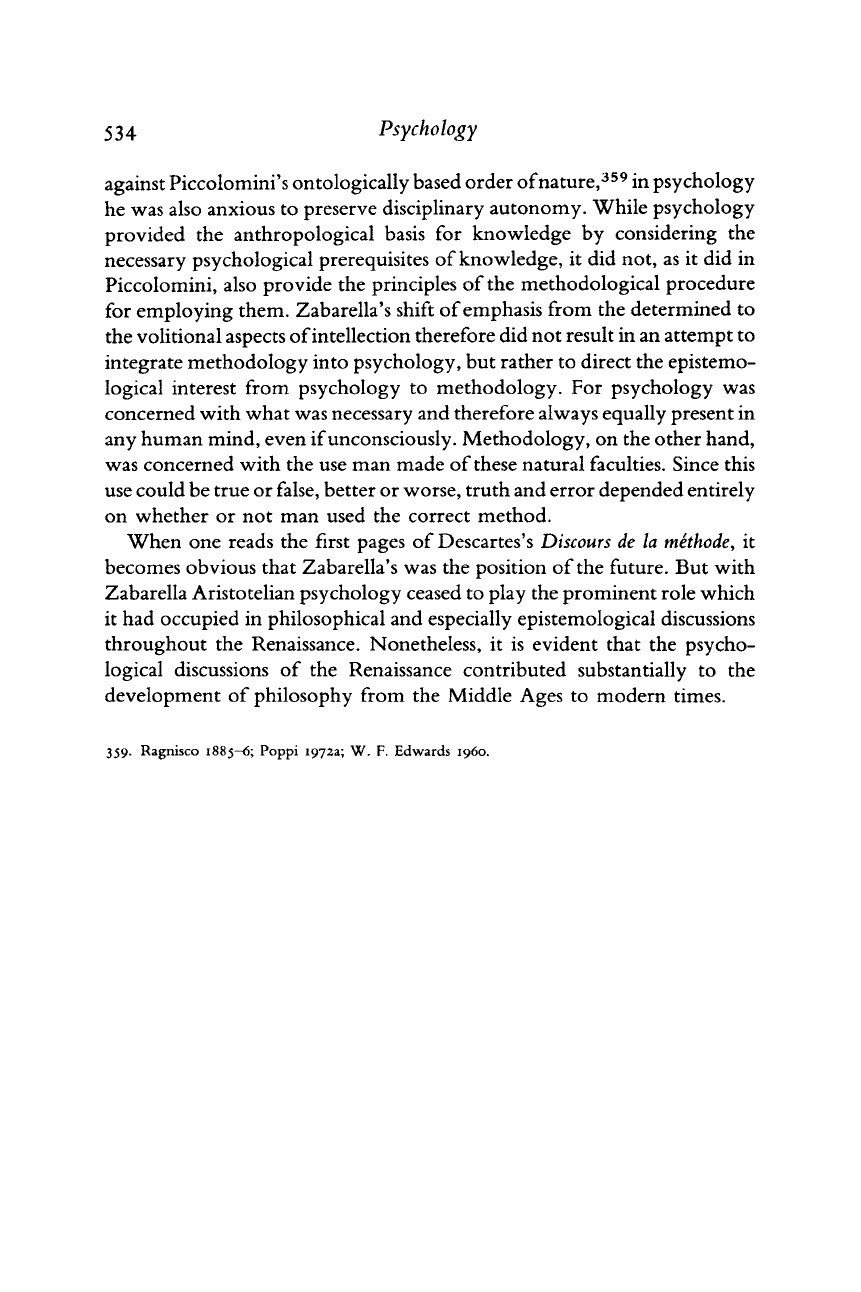
534
Psychology
against Piccolomini's ontologically based order
of
nature,
359
in psychology
he was also anxious to preserve disciplinary autonomy. While psychology
provided the anthropological basis for knowledge by considering the
necessary psychological prerequisites of knowledge, it did not, as it did in
Piccolomini,
also provide the principles of the methodological procedure
for
employing them. Zabarella's shift
of
emphasis from the determined to
the volitional aspects
of
intellection therefore did not result in an
attempt
to
integrate methodology into psychology, but
rather
to direct the epistemo-
logical
interest from psychology to methodology. For psychology was
concerned with what was necessary and therefore always equally present in
any human mind, even
if
unconsciously. Methodology, on the other
hand,
was
concerned with the use man made of these
natural
faculties. Since this
use could be
true
or false,
better
or worse,
truth
and
error
depended entirely
on whether or not man used the correct method.
When one reads the first pages of Descartes's Discours de la méthode, it
becomes obvious
that
Zabarella's was the position of the future. But with
Zabarella Aristotelian psychology ceased to play the prominent role which
it had occupied in philosophical and especially epistemological discussions
throughout the Renaissance. Nonetheless, it is evident
that
the psycho-
logical
discussions of the Renaissance contributed substantially to the
development of philosophy from the Middle
Ages
to modern times.
359.
Ragnisco
1885-6;
Poppi
1972a;
W. F.
Edwards
i960.
Cambridge Histories Online © Cambridge University Press, 2008
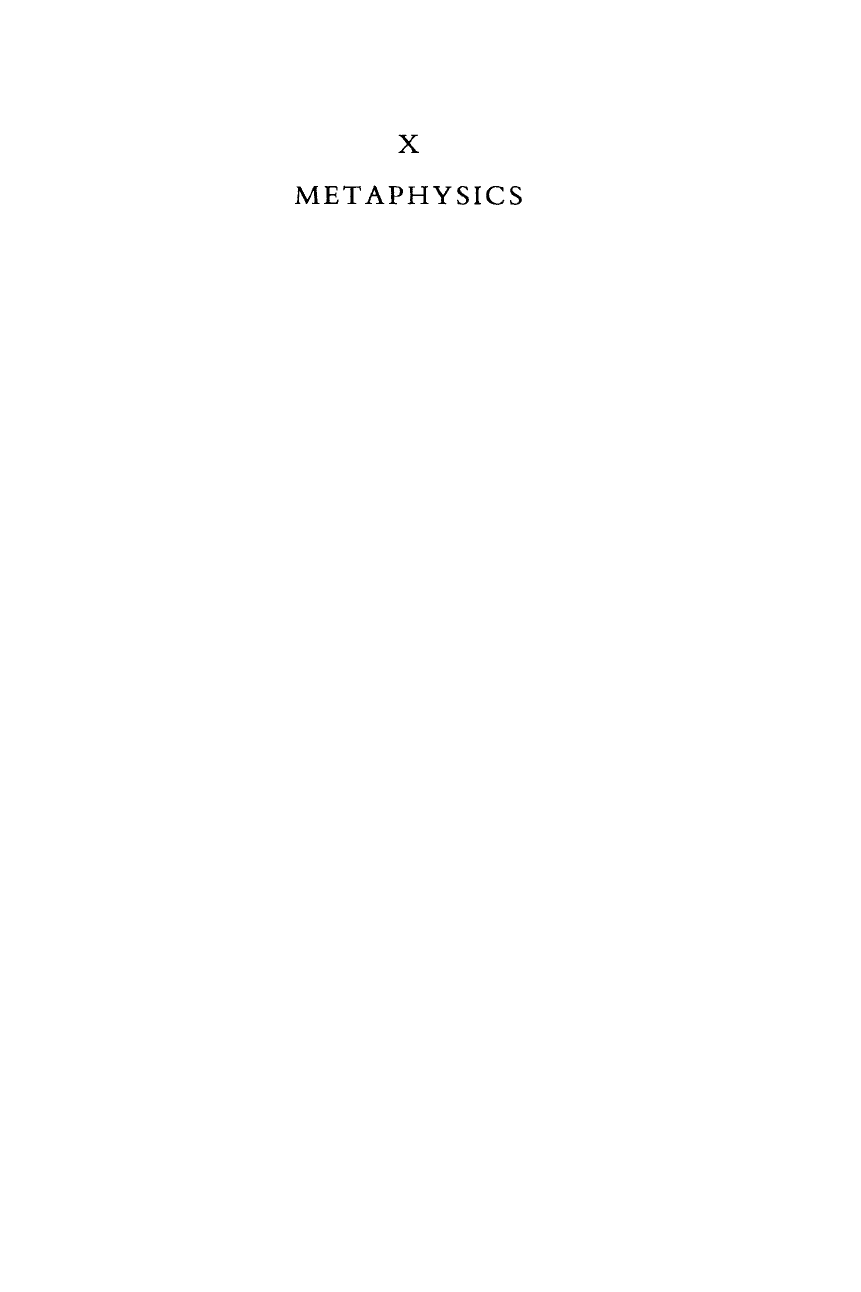
X
METAPHYSICS
Cambridge Histories Online © Cambridge University Press, 2008

Cambridge Histories Online © Cambridge University Press, 2008
